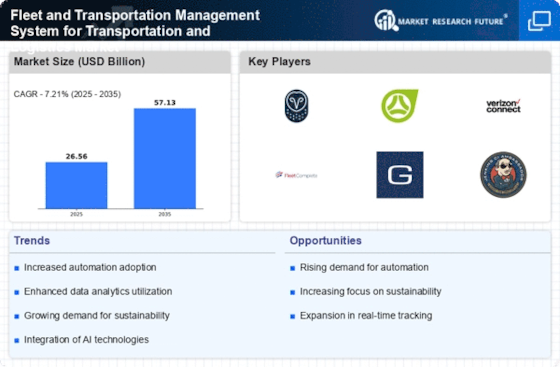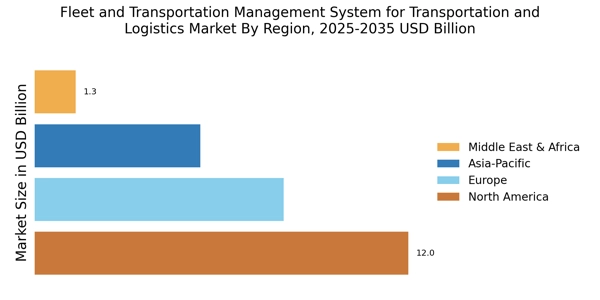Focus on Sustainability
Sustainability has emerged as a critical driver in the Fleet and Transportation Management System for Transportation and Logistics Market. Companies are increasingly adopting eco-friendly practices to reduce their carbon footprint and comply with stringent environmental regulations. The shift towards electric and hybrid vehicles is gaining momentum, with projections suggesting that by 2027, electric vehicles could account for nearly 25% of the total fleet. This transition not only aligns with global sustainability goals but also offers cost savings through reduced fuel consumption and maintenance costs. Furthermore, the implementation of sustainable practices enhances brand reputation and customer loyalty, making it a pivotal factor in the growth of the Fleet and Transportation Management System for Transportation and Logistics Market.
Rising E-commerce Demand
The surge in e-commerce has become a pivotal driver for the Fleet and Transportation Management System for Transportation and Logistics Market. As online shopping continues to grow, logistics companies are under pressure to enhance their delivery capabilities. This demand necessitates efficient fleet management solutions that can handle increased volumes and ensure timely deliveries. Recent statistics indicate that e-commerce sales are projected to reach over 6 trillion dollars by 2024, which will likely lead to a corresponding increase in logistics activities. Consequently, companies are investing in fleet management systems that can optimize routes, manage inventory, and improve customer satisfaction. This trend underscores the critical role of effective fleet management in meeting the evolving needs of the transportation and logistics sector.
Real-Time Data Utilization
The utilization of real-time data is transforming the Fleet and Transportation Management System for Transportation and Logistics Market. Companies are leveraging data analytics to monitor vehicle performance, track shipments, and manage driver behavior. This capability allows for immediate decision-making, which can significantly enhance operational efficiency. For instance, organizations that implement real-time tracking systems report a reduction in delivery times by up to 20%. Additionally, the ability to analyze data trends helps in forecasting demand and optimizing resource allocation. As businesses increasingly recognize the value of data-driven strategies, the demand for advanced fleet management solutions is expected to rise, further propelling the Fleet and Transportation Management System for Transportation and Logistics Market.
Integration of Advanced Technologies
The Fleet and Transportation Management System for Transportation and Logistics Market is experiencing a notable shift towards the integration of advanced technologies such as artificial intelligence, machine learning, and the Internet of Things. These technologies enhance operational efficiency by enabling predictive maintenance, route optimization, and real-time tracking of assets. As a result, companies can reduce operational costs and improve service delivery. According to recent data, the adoption of AI in fleet management is projected to increase by over 30% in the next five years, indicating a strong trend towards technological advancement. This integration not only streamlines processes but also provides valuable insights into fleet performance, thereby driving growth in the Fleet and Transportation Management System for Transportation and Logistics Market.
Regulatory Compliance and Safety Standards
Regulatory compliance and safety standards are increasingly influencing the Fleet and Transportation Management System for Transportation and Logistics Market. Governments worldwide are implementing stricter regulations regarding vehicle emissions, driver safety, and operational practices. Companies must adapt their fleet management strategies to comply with these regulations, which often necessitates the adoption of advanced technologies and systems. For instance, the introduction of electronic logging devices (ELDs) has become mandatory in many regions, ensuring that drivers adhere to hours-of-service regulations. This compliance not only mitigates legal risks but also enhances operational safety, which is paramount in the logistics sector. As regulatory frameworks continue to evolve, the demand for comprehensive fleet management solutions that ensure compliance and safety is expected to grow, further driving the Fleet and Transportation Management System for Transportation and Logistics Market.

















